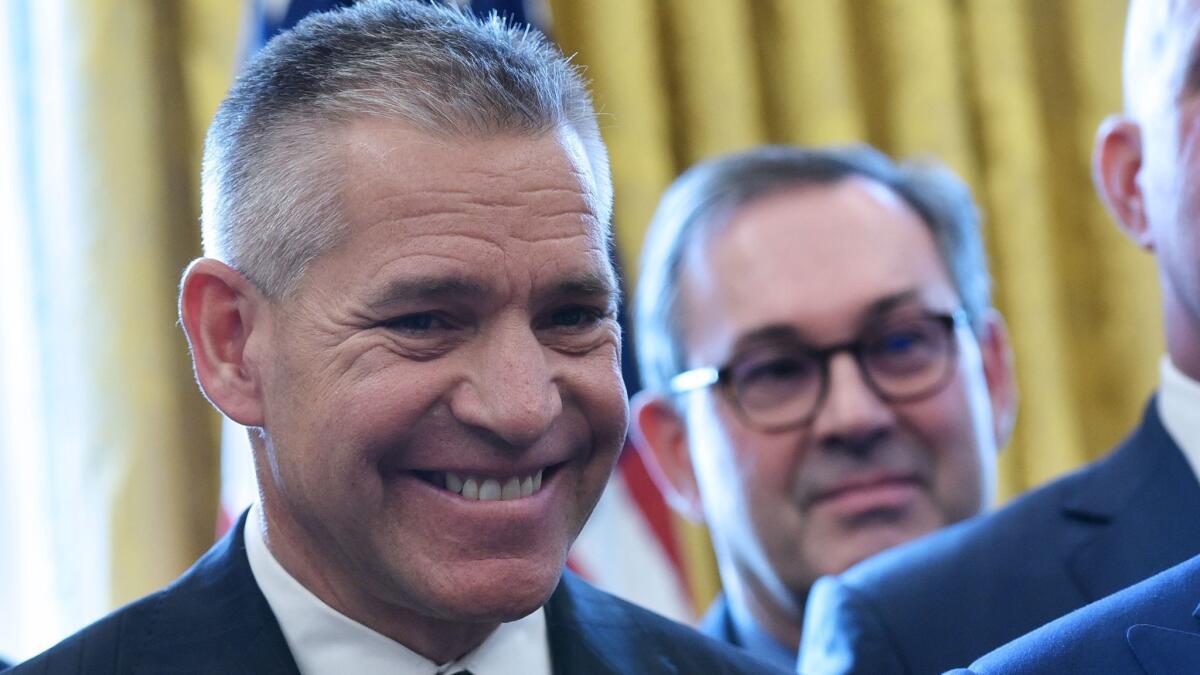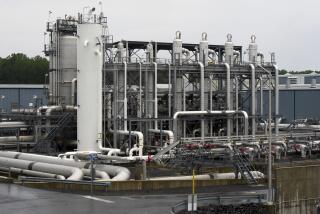TransCanada says it has secured enough customers to proceed with Keystone XL pipeline

- Share via
Reporting from Salt Lake City — The Canadian pipeline company that set out a decade ago to build the $8-billion Keystone XL oil pipeline across the Great Plains said Thursday it had secured enough shipping orders to proceed with construction.
A statement released by TransCanada stopped short of making a commitment to construct the 1,189-mile pipeline from Hardisty, Canada, to Steele City, Neb.
Jane Kleeb, the founder and president of Bold Nebraska, the activist group leading the opposition to the Keystone XL project, said TransCanada faced significant regulatory and state court challenges and the company’s announcement changed little about the prospects that the pipeline would be built.
“If I was nervous, I’d tell you I was nervous,” Kleeb said. “I’m not nervous.”
The struggle to build Keystone XL has become an international symbol of protest against fossil fuels that has commanded the attention of two presidents, and in 2016 became a presidential campaign issue.
Environmentalists have seized on the pipeline as a prominent choke point for limiting consumption of carbon-rich fuel that adds to climate change risks. The protest also has stirred residents in hundreds of communities around the country to launch local campaigns to stop oil and natural gas pipelines from crossing rural America.
President Trump and the fossil energy industry see the Keystone XL protest as an essential political struggle they can win to secure continued production and high consumption of oil and natural gas.
TransCanada’s announcement, after the company’s many years of trying to overcome financial, political and environmental barriers, seemed specifically aimed at informing financial markets and Gulf Coast refineries.
Big banks, among them JPMorgan Chase and Co., which is cautiously evaluating the pipeline, would be expected to help fund the project. Big Texas refineries are where the 830,000 barrels of oil the pipeline transports daily would end up.
Late last year, in a conference call with investors, TransCanada Chief Executive Russ Girling said the company needed to secure commitments to transport 500,000 barrels of oil a day to start construction. In Thursday’s announcement, TransCanada said it was successful in “securing approximately 500,000 barrels per day of firm, 20-year commitments. Interest in the project remains strong.”
“Over the past 12 months, the Keystone XL project has achieved several milestones that move us significantly closer to constructing this critical energy infrastructure for North America,” said Girling, adding a note of appreciation to Trump and his administration “for their continued support.”
Among the oil shippers that have made their transport commitments public is Alberta, Canada. The provincial government promised TransCanada it would rely on the Keystone XL pipeline to transport 50,000 barrels of oil daily for 20 years.
Kleeb said the commitment represented a public subsidy that indicated weakness in TransCanada’s market. “They need government support to try and make it work,” she said. “They are not close to filling the 830,000 barrel capacity of the pipeline.”
TransCanada’s statement comes two months after the Nebraska Public Service Commission approved a 280-mile pipeline route across the state following years of opposition that gained national and international support. The commission’s chosen route, though, was five miles longer and followed a different path from the one preferred by TransCanada, opening the company to more challenges in gaining leases from private property owners along the new route, and additional oversight hurdles from state, and perhaps national, safety and environmental agencies.
Another potential impediment to the Keystone XL is taking shape in federal court. TransCanada’s pipeline is the target of a lawsuit in Montana filed in March by environmental groups against the Trump administration. The plaintiffs assert that the president violated federal environmental law by approving the Keystone XL construction permit early last year without updating the project’s 5-year-old environmental impact report.
The natural resources section of the U.S. Justice Department tried to get the case dismissed. It argued that because Trump’s decision was a “presidential action,” he had full authority to issue the permit without a new review.
In November, U.S. District Judge Brian Morris rejected that argument and ruled that the case could continue.
keith.schneider@latimes.com
More to Read
Sign up for Essential California
The most important California stories and recommendations in your inbox every morning.
You may occasionally receive promotional content from the Los Angeles Times.













